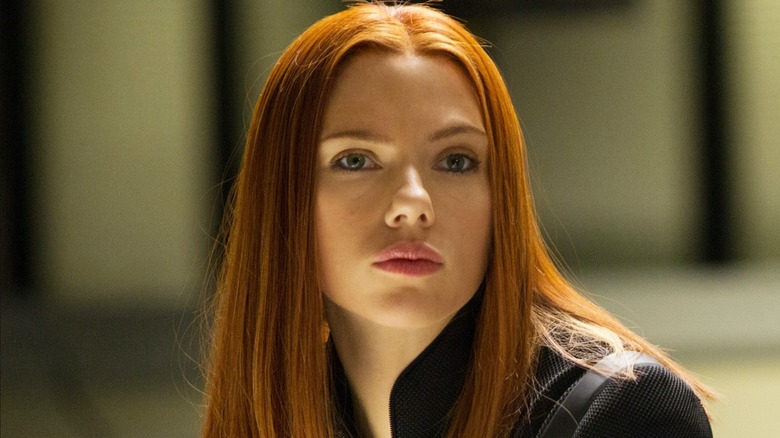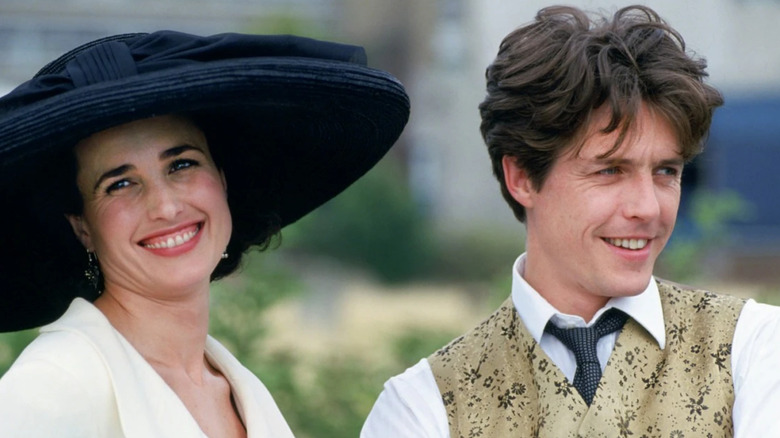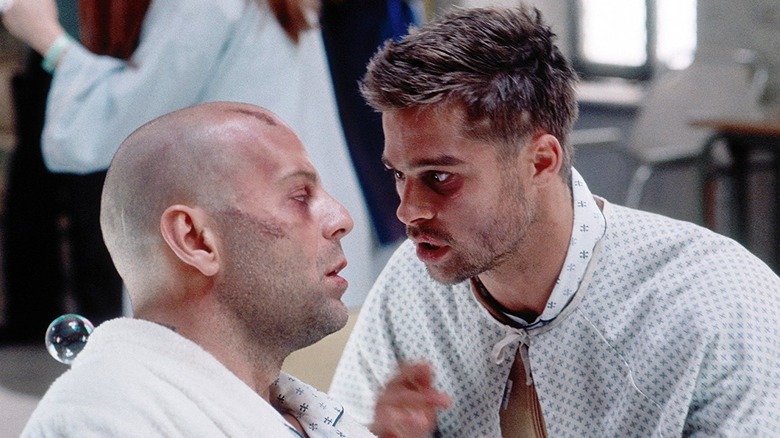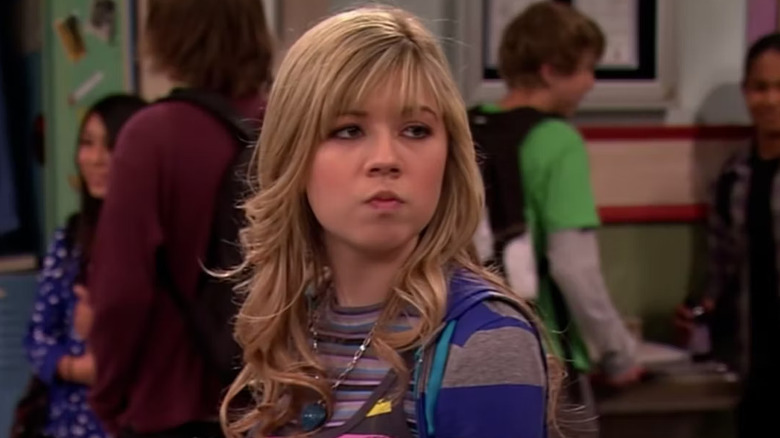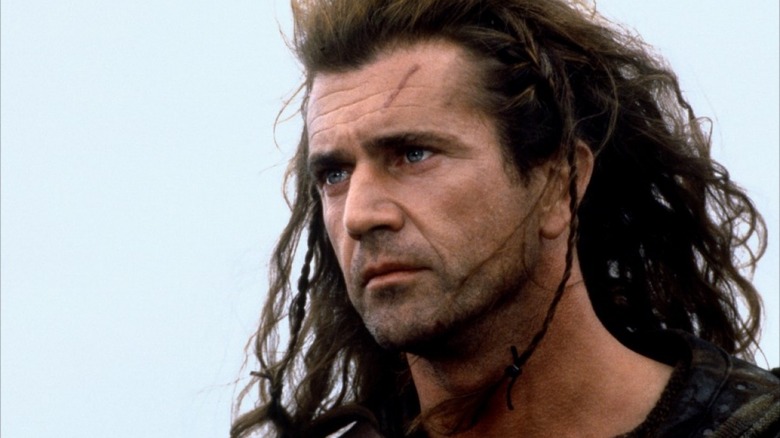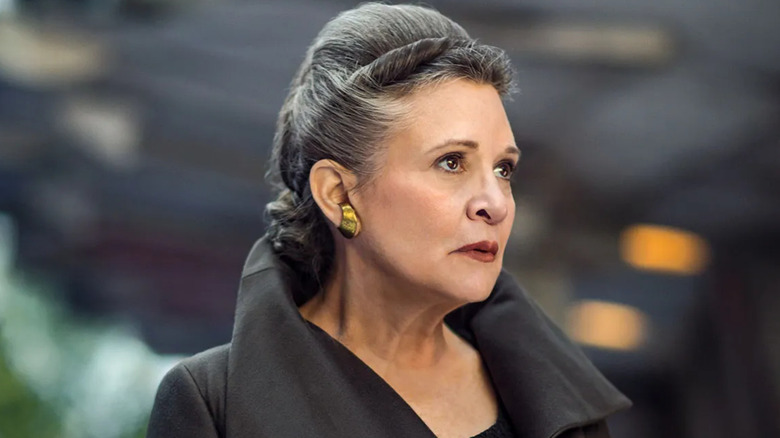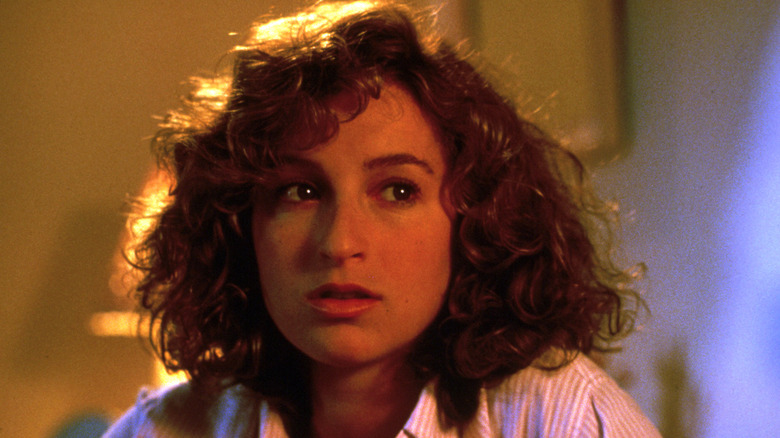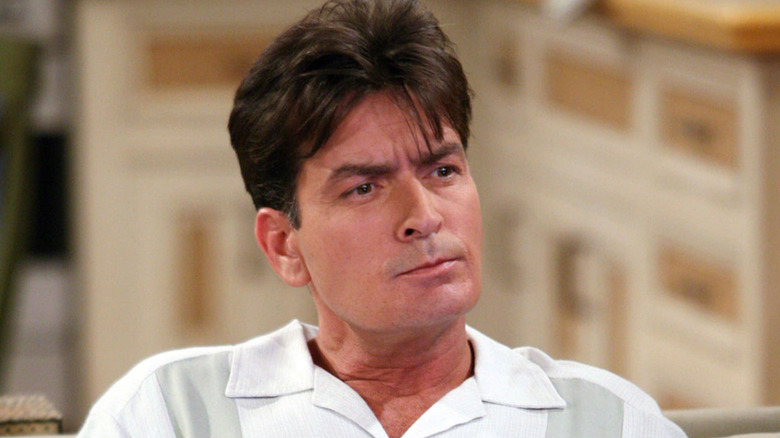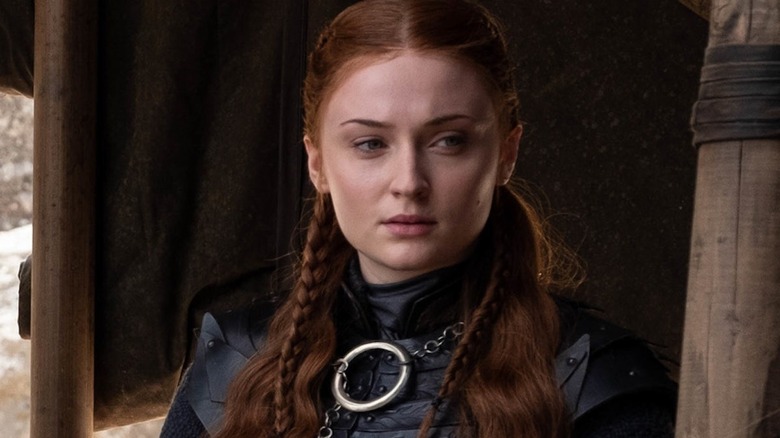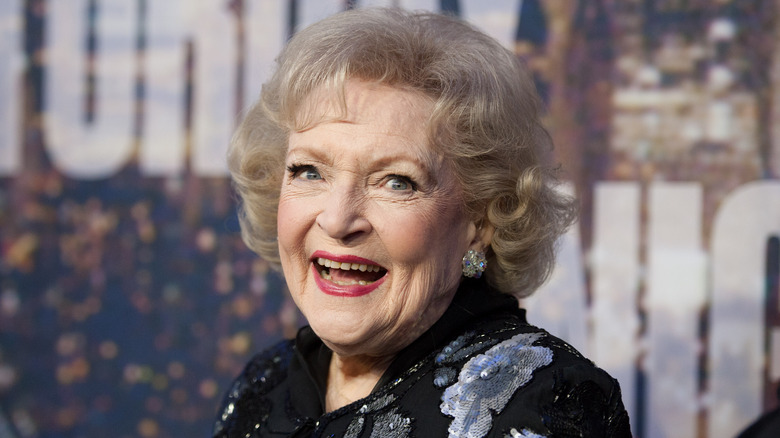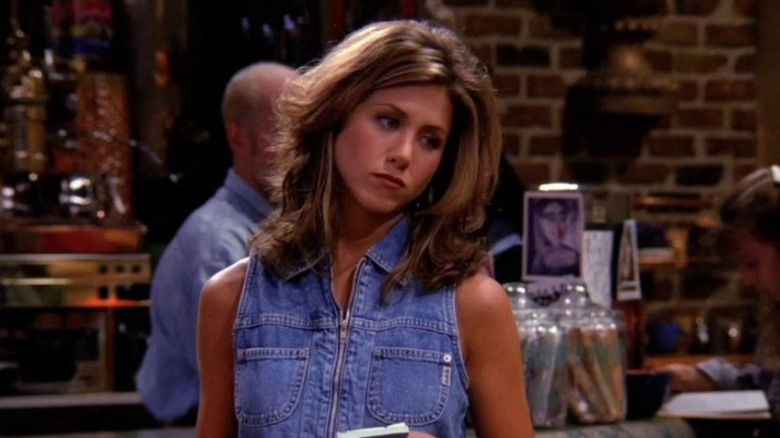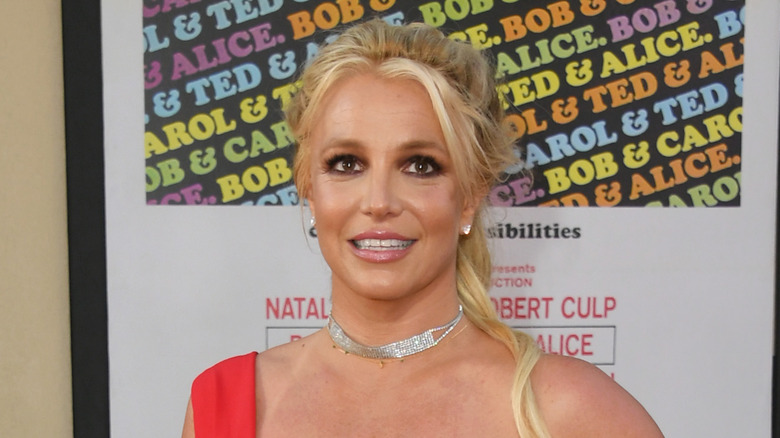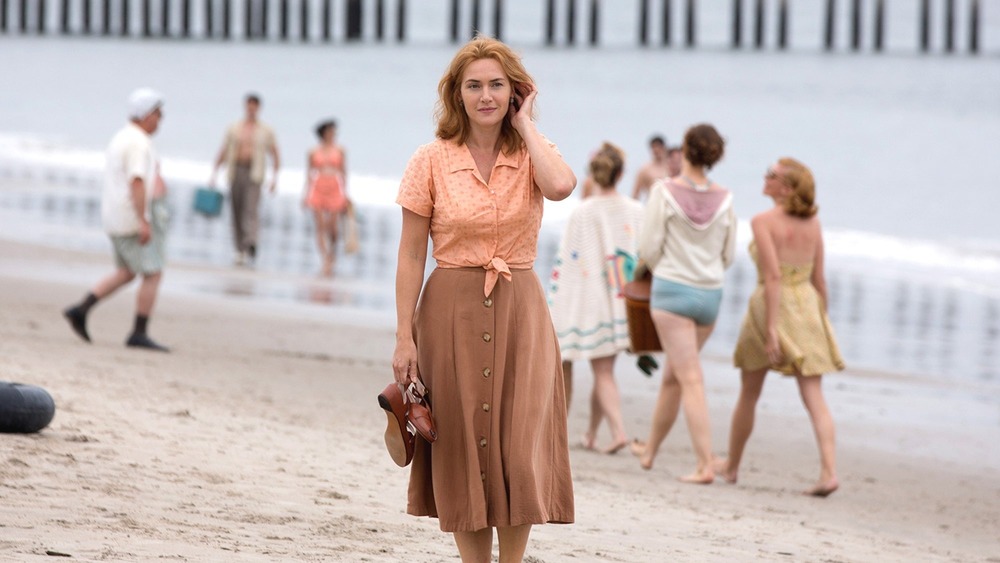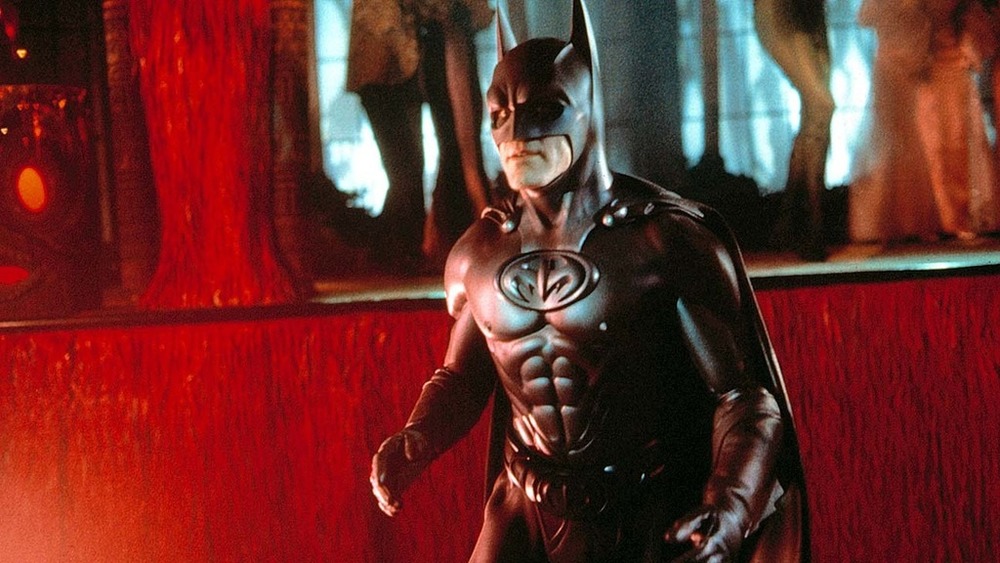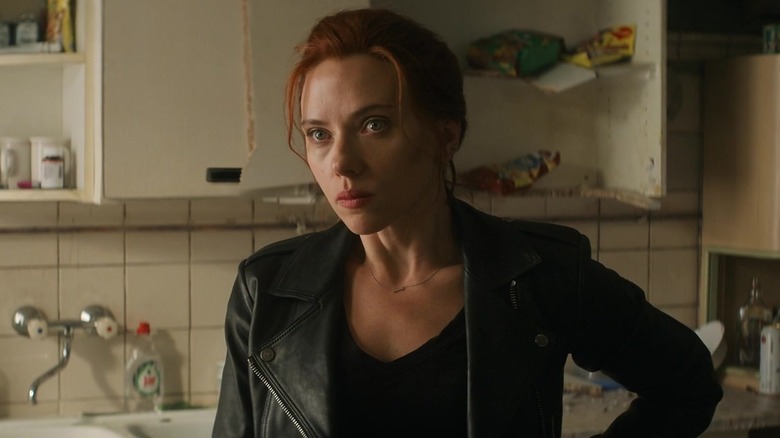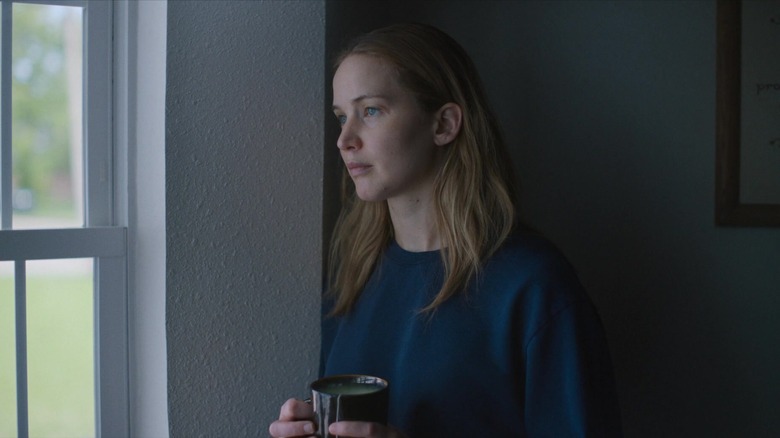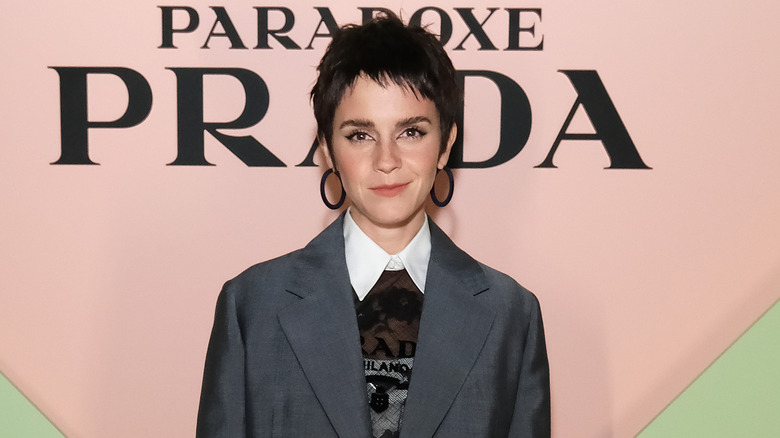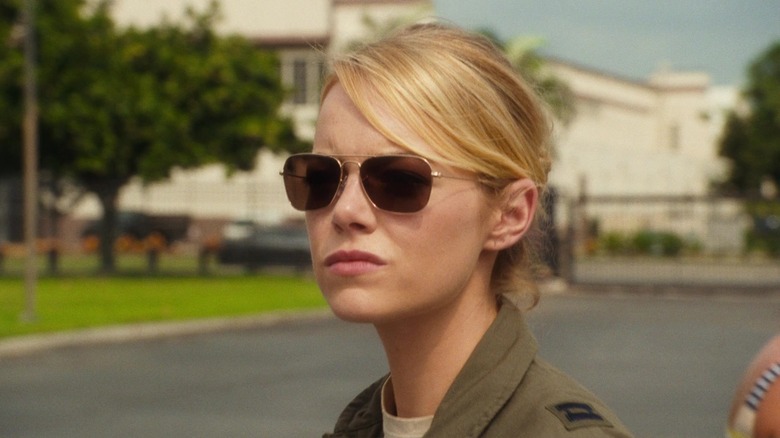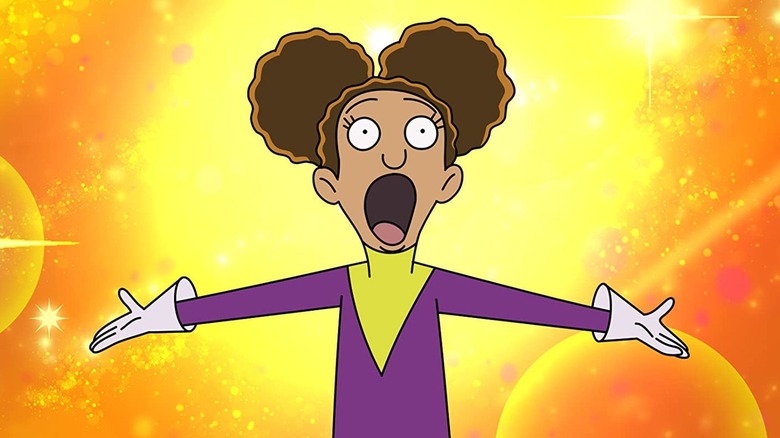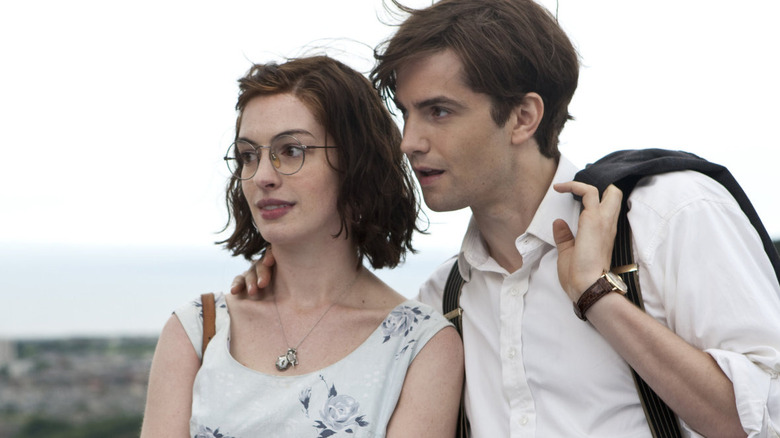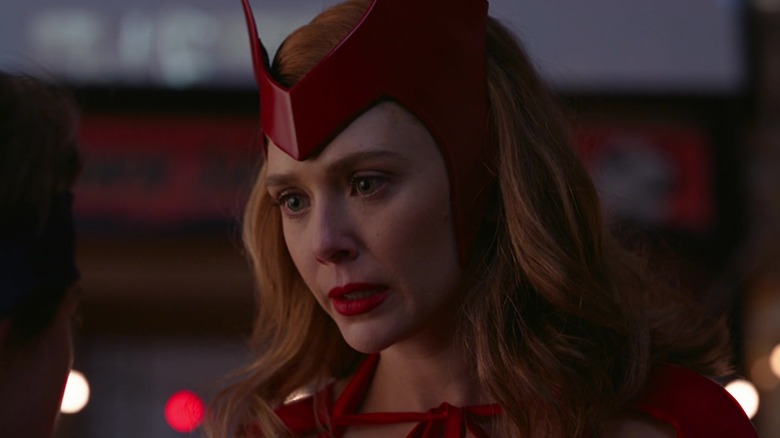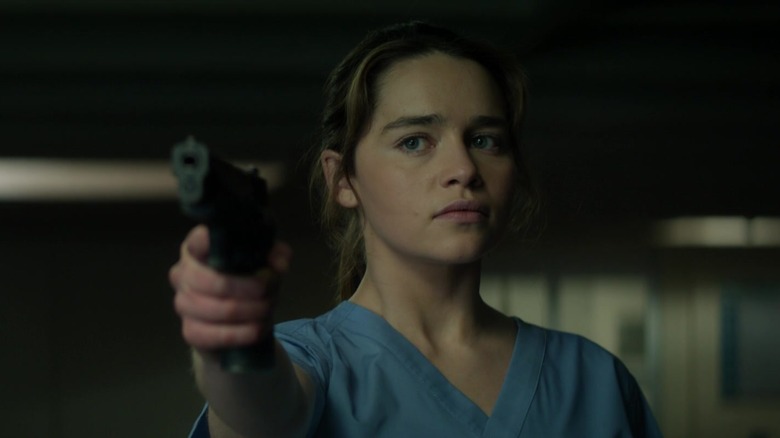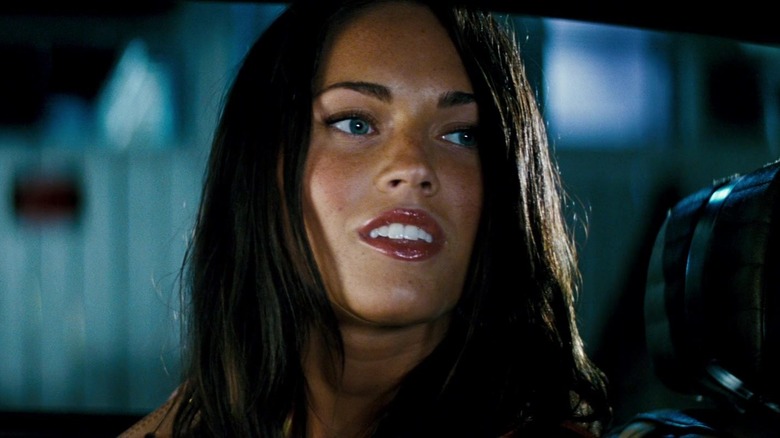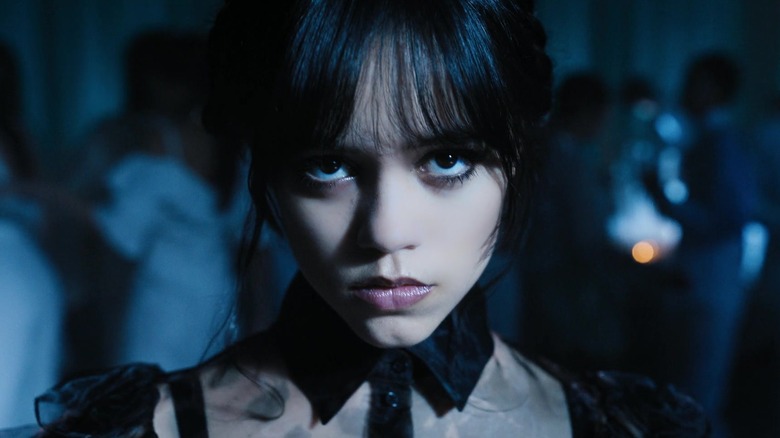Actors That Have Major Regrets About Their Career
All of us have regrets, some big and some small. Working in the entertainment industry means being in the public eye, and the pressure to hold up a particular image can lead to difficult choices and substantial second thoughts. In fact, just about every actor, no matter how successful they are or how high the caliber of project they typically sign on to, has voiced some sort of remorse over an appearance that didn't pan out the way they wanted it to.
This kind of thing is common in Hollywood. The concept or role may seem perfect, but poor writing or direction can tank its potential. The pay may be great enough for an actor to convince themselves to take a role they aren't that excited about. Difficulties can arise at every level of production, from incompatibilities with co-stars and just plain bad acting to unexpected demands from higher-ups or editing debacles in post-production. If you're going to make a living in Hollywood, you're probably going to run into one of these situations at some point in your career.
But some mistakes extend beyond taking a role in a movie that bombed. Some high-profile actors have much deeper regrets about their careers that will come as quite the surprise to onlookers who have only seen the highlight reel of their lives.
Hugh Grant
When you think of Hugh Grant's most famous roles, you probably think of the plethora of romantic comedies in which he has appeared over the years, often as an affable and clever leading man. It doesn't seem like being recognized in this way would leave you much room for remorse, but Grant believes that you can certainly have too much of a good thing — and sometimes, the thing wasn't even that good.
Grant recalls that he would occasionally take roles despite knowing from the beginning that a film would be bad — in fact, sometimes he would accept the part because of that knowledge. He enjoyed bad films, and would even, as a general rule, accept worse roles more quickly than better ones. Looking back, he realized that he didn't have enough experience, or trust in himself, when it came to dealing with fame and success: He'd take roles quickly, without thinking, because he was still in the mindset of an unemployed actor.
By the time he knew better, he'd appeared in so many of the same types of roles that he felt he'd pigeonholed himself beyond rescue. "The world was my oyster," he admitted to USA Today, but instead of pursuing interesting roles, he "repeated himself almost identically about 17 times in a row." Not that we're complaining.
Brad Pitt
Even more surprising than regretting a type of role that has made you hugely popular is one of Brad Pitt's biggest career regrets. While the prolific actor has appeared in multiple films that have received a less-than-stellar reception, in addition to his more highly regarded filmography, his biggest regret actually falls in the latter group. "12 Monkeys," which came out in 1995, was beloved by audiences and critics alike, and Pitt's role actually earned him an Academy Award nomination for Best Supporting Actor.
But years after this early appearance as the insane Jeffrey Goines, Pitt doesn't seem to see what everyone else does. While the role could easily be called a pivotal one in his career, one that pushed him out of the familiar realm of "brooding heartthrob" and into a place of depth and unpredictability, the accomplished actor has instead stated that it "haunts" him. That's right. It's not just that he's looking back with more experienced eyes and reasonable critiques: He says that he can't even watch the second half of the film.
Jennette McCurdy
While the Paramount+ reboot of the immensely popular teen sitcom "iCarly" featured much of the original cast when it debuted in 2021, including Nathan Kress as Freddy, Miranda Cosgrove as Carly, and Jerry Trainor as Spencer, one notable absence was Jennette McCurdy as Carly's best friend, Sam Puckett. By the time the series was given the green light, McCurdy had quit acting altogether.
At the time, McCurdy felt embarrassed and ashamed of the roles she played throughout her career. She also didn't miss the pressure of being the breadwinner for her family (which was her role by the time she was 10 or 11, by her reckoning), nor the imperative to put her own emotions on the back burner for the sake of her roles or the cruel reality of Hollywood's beauty standards that led her to develop an eating disorder. All this she endured for a career that she did not find fulfilling, making it easy to see how the star would harbor resentment.
McCurdy has since recounted many more harrowing memories from her tragic true-life story in her 2022 memoir, "I'm Glad My Mom Died," and while she's hinted at potentially acting again, she remains more interested in writing and directing.
Mel Gibson
Jennette McCurdy isn't the only well-known star who has some major regrets about her career as a whole. Surprisingly, one-time action star Mel Gibson also regrets becoming an actor at all. The man who has worn the hats of performer, producer, and director — sometimes all at once, like in the award-winning historical film "Braveheart" from 1995 — has actually said that if he could go back to his early 20s, he'd make a different choice regarding the direction of his career.
Gibson's reasoning is partly based on what he described to Deadline as the "loss of personal anonymity," as well as the hijacking of one's pure intentions when fame and entertainment take on a life of their own. The choice to become an actor, which he made when he was 21 or 22, is one Gibson describes as "spur of the moment," one that lacked the context of experience or the sway of maturity — and one that, once made, could not be taken back.
Even when he took a break from acting for lower-profile creative pursuits, he said that none of the downsides changed: "You can't put toothpaste back in the tube." We can't help but also wonder whether the one-time superstar also feels the same about some of the dumbest things he did in his personal life as well.
Carrie Fisher
Carrie Fisher was beloved by fans for years as the iconic Princess Leia in the "Star Wars" franchise. At least, that's how it seemed from the fan side of things — but the situation looked a little different on her end. Fame doesn't always convey the love of a fan base to its object: Sometimes it just makes things more complicated.
In Fisher's case, if she had known about all the fame that was going to come with it, she would have gone back and refused the role of Princess Leia. Rather than feeling beloved or iconic, the most salient effect of fame on her psyche was a quiet but ardent desire for it all to end: Waiting for that day was what consumed her life when she became really well-known, she admitted.
This level of honesty was characteristic of the actress, who had been through a lot before her untimely death in 2016 at the age of 60. Her sense of humor and genuine personality were far more responsible for fans' adoration than any role, no matter how great.
Jennifer Grey
Jennifer Grey was America's "Baby," the endearing co-star of 1987's "Dirty Dancing" alongside Patrick Swayze. This film, and the performance of its two top-billed stars, is synonymous with '80s nostalgia and remains timelessly quotable and meme-able to this day. Instagram influencers attempt time and again to recreate the iconic lift, and references to the film have made it into everything from casual conversation to modern-day sitcoms.
So if the film and its stars are so timeless, where is Jennifer Grey today? The actress, whose career took a dive after the success of this role, says that her "nose job from hell" was to blame for making her unrecognizable. She went into an operating room as a celebrity, she says, and came out anonymous: Even her friends didn't recognize her!
She even tried to make light of the catastrophe with a role as herself in the 1999 sitcom "It's Like, You Know...," but the series was canceled after two seasons, and her career was never the same. Botched plastic surgeries aren't uncommon in Hollywood, but to be made anonymous is a terrible price to pay, even by industry standards.
Charlie Sheen
Charlie Sheen has a lot of regrets, from his public fights with colleagues to the cringeworthy remarks he is now famous for, but one of the biggest is how poorly he handled his salary dispute on "Two and a Half Men." At the time, Sheen was one of the highest-paid actors on television and also one of the most volatile, with his headline-making conflicts, outbursts, and bizarre remarks defining much of his life in the 2000s.
Sheen chalks a lot of this tumultuous time up to the fact that he was struggling with addiction and mental health problems: His private battles gave way to public ones, including an assault on his ex-wife that resulted in a stint in rehab, and a long-running beef with the creator of "Two and a Half Men," Chuck Lorre, that involved a series of public, verbal attacks and aggressive rants in interviews after Sheen was fired from the show in 2011 for destructive behavior.
But of all of these mistakes, the one Sheen regrets the most might surprise you: He told Insider that he shouldn't have asked for more money on "Two and a Half Men," saying, "There was 55 different ways for me to handle that situation, and I chose number 56." It was a juvenile choice that, among others at the time, led him to pursue personal growth.
Sophie Turner
"Game of Thrones" fans got a front row seat to most of actress Sophie Turner's youth over the 10 years she appeared on the show. Her character, Sansa Stark, grew up right along with her, from a timid young girl promised in marriage to a sociopathic prince, into a strong young woman capable of protecting herself and her family. It's clear that Sansa learned a lot about her own fantasy world throughout "Game of Thrones," from diplomacy to combat, conspiracy to family.
But these lessons aren't necessarily transferable to the life and coming-of-age of a young English actress: Instead, what would have been Turner's high school and college years were supplanted by her time on "Game of Thrones." There are certain things about the "university experience," she muses, that can't be replicated, and ultimately it's an experience she wishes she had had — the stereotypical drunken nights with friends especially.
Still, from age 13 to age 23, she did have a great time on the set of the HBO fantasy drama, where she had plenty of people around her who took care to protect her from the adult world by which she was surrounded from a young age.
Betty White
Betty White enjoyed one of the longest, most well-loved careers in Hollywood before her death at age 99 on December 31, 2021. White began entertaining others when she was just eight years old, playing a crippled orphan on a radio drama called "Empire Builders." Many people knew her best from shows like "The Golden Girls," but by the time that popular sitcom aired in the 1980s, her career was already four decades old.
She only became more of a household name in her later years. The secret to her long life, White once quipped, was her love of pets, hot dogs, and vodka. But one of her greatest loves was the one that taught her not about how long life is, but how short. Part of the reason we love Betty White so much is the effort she put into building her television career over the years. But this was, in a way, her greatest regret. After two short-lived marriages, White finally met and fell in love with Allen Ludden, whom she remained with for 18 years.
When he died of stomach cancer, she realized that she deeply regretted wasting time that she could have had with the love of her life. She kept telling herself that she wouldn't leave her life in California for New York, despite his multiple proposals. It took her a year to finally say yes, and that year was something she later said she'd redo in a heartbeat.
Jennifer Aniston
Jennifer Aniston has a complicated relationship with Rachel, her iconic character from the seminal '90s sitcom "Friends." The role became so well-known that Aniston felt she might never be able to separate herself from it: She once said that the part felt completely inescapable — she told the Hollywood Reporter that she just "couldn't get Rachel Green off her back" and wanted the show to stop running.
But her back wasn't the place that Rachel did the most damage: For Aniston, it was the top of her head. During the first season, the actress and her character became famous for a hairstyle popularly dubbed "the Rachel," to the point where women across the country went to their stylists in droves asking for the star-powered cut. To Aniston, though, it's simply another example of Rachel's inescapable allure: She could convince an entire audience of women to get a layered and highlighted shag cut that was (via Today) "the ugliest haircut [Aniston] had ever seen."
Aniston hated the cut because without the assistance of the man who created it, Chris McMillan, she simply couldn't style the "frizzy mop" on her own. She's also on record saying that her stylist at the time, whom she still loves, was stoned when he created it.
Britney Spears
One of the least surprising regrets on this list is Britney Spears' embarrassment over her reality show, "Chaotic," which chronicled her relationship with ex-husband Kevin Federline. Critics called it (via EW) "career suicide by videocam," and the general consensus about its impact on her career has been about the same. Capturing the chaos (at least the title was accurate) in one scene, she demands to know whether the audience can "handle her truth" in between shots of glitter and makeup.
Apparently, fans weren't that interested in the truth, or perhaps didn't find much of it in "Chaotic." The series, whose viewership was modest to begin with, lost almost half of its audience over its five episodes before it was canceled due to Spears' knee injury during the "Outrageous" music video shoot.
But while she regrets the endeavor now, her original intentions were relatively pure: The show simply had the exact opposite effect to the one she wanted. When she announced the series, she expressed a desire to become free of the tabloid media portrayals that had "run her life" the previous year, and was excited to communicate honestly with fans. But "Chaotic" just gave critics something new to run with, and she later acknowledged it (via E! Online) as "probably the worst thing" she's done in her career.
Kate Winslet
There was a considerable reckoning in Hollywood in the latter half of the 2010s, with hundreds of women from all industries launching a movement known as Time's Up, aimed at ending gender discrimination and sexual harassment in the professional world. After the revelations of Harvey Weinstein's misconduct opened the floodgates for survivors to speak up about incidents involving many different individuals, actors and actresses throughout Hollywood were forced to re-evaluate their career and company choices.
The renewed attention placed on sexual misconduct in Hollywood illuminated some unpleasant truths about long-revered directors such as Woody Allen, whose daughter Dylan Farrow wrote an open letter to the New York Times in 2014 alleging that her father had molested her as a child, and Roman Polanski, who has been the subject of multiple assault allegations.
Although she has expressed remorse over other areas of her career, Kate Winslet has stated that working with morally shady directors like Woody Allen on "Wonder Wheel" and Roman Polanski on "Carnage" is one particular regret that she continues to, as she told Vanity Fair, "grapple with." Winslet questions what she thought she was doing at the time, while acknowledging that she must take responsibility for the part she played in the high regard these men enjoyed for so long.
George Clooney
George Clooney regrets assuming that 1997's "Batman and Robin" would be his big break. To be fair, that's a reasonable assumption to make of a big-budget superhero flick, but it's certainly a far cry from the reality of a film he has since called (via the Independent) a "waste of money" — although he also said that the experience taught him to pick better films to take part in.
The gravity of this regret is what makes it so notable: Clooney went from calling his friends screaming when he got the part to being utterly disgusted (along with critics and theatergoers) with the final product, apologizing profusely to fans multiple times and even expressing a fear that he had destroyed the role and the franchise.
But most importantly, Clooney holds the experience close to his heart as a reminder of the lesson it taught him. By assuming that the role would be his big break, he made the mistake of focusing more on the commercial motivations for making a film than the actual merit of the project. He displayed a photo of himself as Batman on his office wall so that he would never forget that lesson.
Scarlett Johansson
Ever since Scarlett Johansson landed her breakout role in 2003's "Lost in Translation," she has reigned over Hollywood as one of the preeminent leading ladies of her generation. From starring in indie projects like the 2013 sci-fi thriller "Under the Skin" (directed by future Academy Award nominee Jonathan Glazer) to playing Russian super-spy Natasha Romanov in the Marvel Cinematic Universe, the litany of characters throughout her body of work can broadly be described as complex, formidable, and arresting.
On the other hand, this character type can unfortunately be reduced to a hypersexualized male fantasy in the eyes of audiences and casting directors alike — a reality which gave Johansson constant anxiety about her career longevity. Speaking to fellow performer Dax Shepard on the "Armchair Expert" podcast, the 39-year-old actor shared that she felt "objectified" by the industry early in her career, confined to a handful of demeaning archetypes that felt foreign to her. "I remember thinking to myself, 'I think people think I'm 40 years old,'" she told Shepard. "[Being older] somehow stopped being something that was desirable and [became] something that I was fighting against."
Despite feeling that her career growth had stagnated just as quickly as it had began, Johansson has been able to portray a wide variety of characters in recent years in films such as "Marriage Story" and "Jojo Rabbit" – both of which earned her Oscar nominations in 2020, making her one of only a dozen actors in history to be nominated twice in one season.
Jennifer Lawrence
Before she was Katniss Everdeen, Jennifer Lawrence was just a young, struggling actor trying to get noticed. Sure, she went up for competitive jobs (she even auditioned for "Twilight" before she booked "The Hunger Games"), but certainly wasn't in the position to be turning down roles. By the time the early 2010s rolled around, however, her performance in "Winter's Bone" had led to leading parts in blockbuster hits including "X-Men: First Class," as well as the aforementioned young-adult adaptation. And when she ran up the stairs to accept an Academy Award at just 22 years old for her work in "Silver Linings Playbook," she likely felt her days of desperation were definitely over, the statue in her hand surely earning her a rare level of autonomy in her industry. Sadly, that isn't exactly how things played out.
In an interview with the New York Times, Lawrence admitted that she had "let [herself] be hijacked" by her creative team, whose vision of the actor as a blockbuster action star conflicted with her own aspirations. "I found out that a lot of filmmakers that I really loved and admired had scripts that weren't even reaching me," she revealed, seemingly going on to say that — had she taken a more proactive, assertive role in her career path — she would have made less films like "Passengers" and "Red Sparrow," and more like 2022's "Causeway." "Everything was like a rebound effect [after 'Hunger Games']," she told the outlet. "I was reacting, rather than just acting."
Emma Watson
It may surprise some to learn that — despite her sizable fame and cultural impact — Emma Watson has appeared in less than 20 feature films throughout her career (eight of which were "Harry Potter" movies). Her last project, Greta Gerwig's remake of "Little Women," was theatrically released five years ago, and there's not much to suggest that she's working on anything due out in the near future. While one might assume that Watson has struggled to maintain her post-Wizarding World career and/or is perfectly happy to enjoy the vast fruits of that chapter of her life, the reality is that she just wasn't particularly fond of doing press tours.
"The thing I found really hard was that I had to go out and sell something that I really didn't have very much control over," she told the Financial Times in 2023. "To stand in front of a film and have every journalist be able to say, 'How does this align with your viewpoint?' It was very difficult to have to be the face and the spokesperson for things where I didn't get to be involved in the process." Watson further described feeling "frustrated" and "caged" by her role as an actor, and has since resolved to work on projects wherein she has enough control and knowledge to stand behind it wholeheartedly. One way she's been able to regain this ground? By studying to be both a writer and director.
Emma Stone
Just before Scarlett Johansson arguably became the face of Hollywood's whitewashing problem (for taking the lead role in the 2017 live-action "Ghost in the Shell" adaptation), Emma Stone reignited the discourse in a major way when she appeared in the 2015 romantic comedy "Aloha." This baffling feature was torn to shreds by critics upon release for, among other things, casting Stone as a Chinese-Hawaiian woman named Allison Ng. Director Cameron Crowe acknowledged and partially apologized for the choice, claiming that the character was based on a real person who — despite identifying with a mixture of ethnic backgrounds — appeared solely white.
At the time, Stone carefully balanced standing by her director and admitting that the casting was ill-conceived, wading through the imbroglio mostly unscathed while promoting her next project (which, ironically, was a Woody Allen movie). But even though it didn't meaningfully hinder her career, save a few jokes here and there at her expense, the actor doesn't seem to relish her participation in the film. When Sandra Oh ribbed both her and Johansson about playing Asian characters at the Golden Globes, Stone could be heard screaming from the audience, "I'm sorry!" Fortunately, this would be the last major instance of Emma Stone-related discourse — at least, until the "Poor Things" sex scene controversy.
Kristen Bell
Speaking of whitewashing characters, "The Good Place" star Kristen Bell made a similar — but somehow even more misguided — choice as Emma Stone, having taken the role of Molly Tillerman in the short-lived Apple TV+ animated comedy "Central Park." Created by Nora Smith, Bell's "Frozen" co-star Josh Gad, and "Bob's Burgers" creator Loren Bouchard, the series inexplicably featured Bell as a mixed-race child (the daughter of Leslie Odom Jr. and Kathryn Hahn). The choice drew criticism from audiences and journalists, as it became apparent that several animated comedies — "Central Park" included — were comfortable merely providing on-screen, symbolic representation without actually adding people of color to their casts.
From Cleveland Brown (Mike Henry) and "The Simpsons" mainstay Apu (Hank Azaria) to Diane Nguyen (Alison Brie) and "Big Mouth" character Missy (Jenny Slate), many white actors like Bell have stepped down from their roles and, in many cases, apologized for having ever accepted them. "Playing Molly in 'Central Park' shows a lack of awareness of my privilege," she said in a statement on social media (via CNN). "Casting a mixed race character [with a] white actress undermines the specificity of the mixed race and Black American experience." For the last two seasons of the show, Molly was voiced by Emmy Raver-Lampman, while Bell was recast in the role of Abby Hunter for Season 3.
Anne Hathaway
If you've been enjoying the surprise hit Netflix series "One Day," you'll be interested to know that the book was originally adapted into a 2011 feature film starring Jim Sturgess and Anne Hathaway. Though most who saw it likely only remember it for the insane, out-of-left-field plot twist toward the end, it's also somewhat notable as Hathaway's first major film in which she worked with a female director, Lone Scherfig.
Though she had previously worked with Barbara Kopple on the direct-to-DVD crime film "Havoc" in 2005, "One Day" was Hathaway's first opportunity to collaborate with — and be led by — a woman working on a project of this scale. As she told ABC News in 2017, this forced the actor to confront an unconscious bias she wasn't aware she had, as she felt herself struggling to find faith in Scherfig's vision. "I am to this day scared that the reason I didn't trust her the way I trust some of the other directors I work with is because she's a woman," she shared. "I hope people understand that it's hard to admit." Though she said that she regretted how internalized misogyny impacted her mindset, she stated at the time that the experience taught her more than any other film she'd done to that point.
Elizabeth Olsen
For better and for worse, Elizabeth Olsen was never the same after joining the Marvel Cinematic Universe. Being cast in 2013 as Wanda Maximoff — aka the Scarlet Witch — and playing a major role in 2015's "Avengers: Age of Ultron" escalated her star power almost instantaneously, effectively securing her almost a decade's worth of high-paying work within the ever-sprawling MCU.
As exciting as that likely was at first, however, it soon gave way to a common negative side-effect of signing one of these comprehensive superhero contracts — a near-complete lack of time and energy to do anything else creative. Marvel actors are essentially forced to prioritize a single role for several years, circumstances which could surely stoke an understandable level of resentment toward even the most fulfilling of characters. For Olsen, loving Wanda wasn't enough to satisfy the part of her that wanted to take on more diverse projects. Speaking to the New York Times, she recalled a particularly painful opportunity she lost to the Marvel-monster — a starring role in Yorgos Lanthimos' "The Lobster."
Losing the chance to participate in such a unique film frustrated Olsen. She explained to the Times, "I had this job security, but I was losing these pieces that I felt were more part of my being." She's since fought hard to expand her roles outside the MCU, and — following her apparent "death" in 2022's "Doctor Strange in the Multiverse of Madness" — seems to be taking a step back from the franchise for the foreseeable future.
Emilia Clarke
From "Star Wars" to "Game of Thrones" to the Marvel Cinematic Universe, Emilia Clarke is a well-known face to nearly every corner of the geek galaxy. But while her luck in this realm is a mixed bag at best (we're still recovering from both Daenerys' bizarre heel-turn and the single CGI Drax arm in "Secret Invasion"), one coveted property in particular left a horrible taste in her mouth.
In a 2019 cover story for Vanity Fair, Clarke was surprisingly blunt when discussing 2015's "Terminator: Genisys," a project which was — by her account — a disaster to be a part of. "No one had a good time," she admitted, before sharing that the crew of that same year's equally, if not even more, infamous "Fantastic Four" had jackets made that read, "AT LEAST WE'RE NOT ON TERMINATOR."
Clarke was joined on "Genisys" by Matt Smith (who would join the world of Westeros years later in "House of the Dragon") and frequent "Thrones" director Alan Taylor, the latter of whom she described as being "eaten up and chewed out" during production. She even said that she was relieved when the film bombed at the box office, as it killed any chance of a direct sequel getting made. Though another "Terminator" film was released in 2019, it was done so without any involvement from Clarke.
Megan Fox
Even if it helped turn her into a household name, Megan Fox has one regret about her time as a "Transformers" star. While shooting the first two films of the franchise, the actor got a first-hand look at Michael Bay's infamously bombastic directing style, which created a level of chaos she wasn't used to. For example, a behind-the-scenes video taken on the set of "Ambulance" went viral for showing several crew members seemingly running for cover from a fiery car chase gone wrong, while an extra on "Transformers: Dark of the Moon" successfully sued the studio for over $18 million in damages after a stunt left her with permanent brain damage.
It sounds like working with Michael Bay can be stressful to say the least — and during a 2009 interview with Wonderland, Fox shared her stress in an incredibly distasteful way. "He's like Napoleon and he wants to create this insane, infamous madman reputation," she told the magazine. "He wants to be like Hitler on his sets, and he is." Fox's casual evocation of Adolf Hitler drew understandable ire from the entertainment community — allegedly including Steven Spielberg, who reportedly ordered Bay to fire her from the third film as a consequence. She's since expressed remorse for how she acted, telling Cosmopolitan in 2017, "All I had to do was apologize — and I refused ... Once I realized I brought it on myself, it was an invaluable learning experience."
Jenna Ortega
It's never been possible to predict what the collective consciousness of the internet will choose to fixate on at any given time, but most sites seems to have provided a new space for film and TV clips to go viral. None captivated this space in the same way as a (in her view, apparently mortifying) clip of Jenna Ortega dancing that circulated feverishly online.
The clip in question comes from the Netflix-Tim Burton series "Wednesday," which drew a respectable audience back in 2022 for its offbeat tone and dark sense of humor. At a school dance, Ortega's Wednesday Addams performs an awkward yet strangely entrancing dance routine set to The Cramps' "Goo Goo Muck." Someone online took the dance and replaced the music with a pitched up version of Lady Gaga's "Bloody Mary," and an online sensation was born.
For Ortega, this was something of a nightmare. "When they were telling me [it was going viral], I was trying to seem uplifted about it, like, 'Oh, wow!'" she told The Times. "But mentally, in my head, I was hoping people wouldn't pay so much attention to that part ... I don't think people are naturally designed to have that many eyes on them." Likely adding to the anxiety was the fact that Burton tasked Ortega with choreographing the scene herself, an assignment which she had barely two days to execute. The final product seen on Netflix is, according to her, partially improvised.
